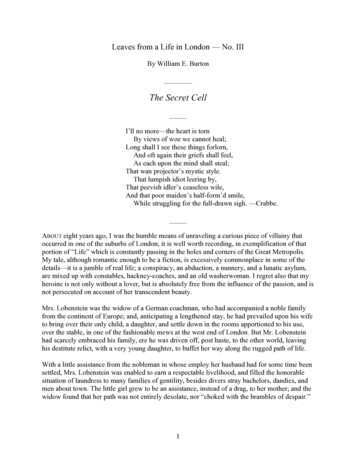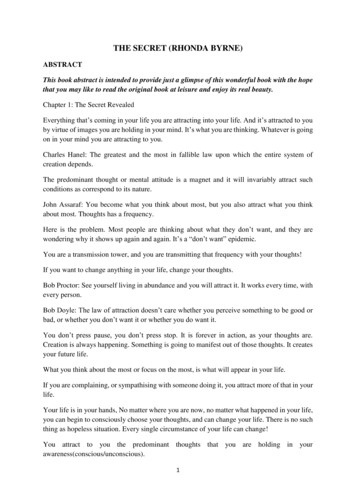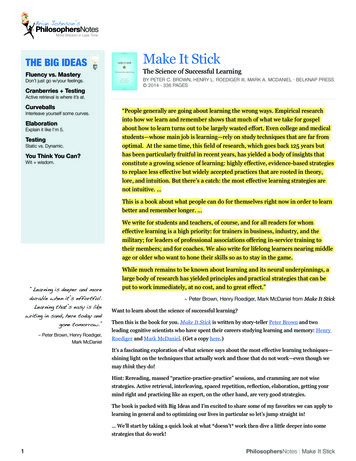
Transcription
Leaves from a Life in London — No. IIIBy William E. BurtonThe Secret CellI’ll no more—the heart is tornBy views of woe we cannot heal;Long shall I see these things forlorn,And oft again their griefs shall feel,As each upon the mind shall steal;That wan projector’s mystic style.That lumpish idiot leering by,That peevish idler’s ceaseless wile,And that poor maiden’s half-form’d smile,While struggling for the full-drawn sigh. —Crabbe.ABOUT eight years ago, I was the humble means of unraveling a curious piece of villainy thatoccurred in one of the suburbs of London; it is well worth recording, in exemplification of thatportion of “Life” which is constantly passing in the holes and corners of the Great Metropolis.My tale, although romantic enough to be a fiction, is excessively commonplace in some of thedetails—it is a jumble of real life; a conspiracy, an abduction, a nunnery, and a lunatic asylum,are mixed up with constables, hackney-coaches, and an old washerwoman. I regret also that myheroine is not only without a lover, but is absolutely free from the influence of the passion, and isnot persecuted on account of her transcendent beauty.Mrs. Lobenstein was the widow of a German coachman, who had accompanied a noble familyfrom the continent of Europe; and, anticipating a lengthened stay, he had prevailed upon his wifeto bring over their only child, a daughter, and settle down in the rooms apportioned to his use,over the stable, in one of the fashionable mews at the west end of London. But Mr. Lobensteinhad scarcely embraced his family, ere he was driven off, post haste, to the other world, leavinghis destitute relict, with a very young daughter, to buffet her way along the rugged path of life.With a little assistance from the nobleman in whose employ her husband had for some time beensettled, Mrs. Lobenstein was enabled to earn a respectable livelihood, and filled the honorablesituation of laundress to many families of gentility, besides divers stray bachelors, dandies, andmen about town. The little girl grew to be an assistance, instead of a drag, to her mother; and thewidow found that her path was not entirely desolate, nor “choked with the brambles of despair.”1
In the sixth year of her bereavement, Mrs. Lobenstein, who presided over the destinies of mylinen, called at my rooms, in company with a lady of equal width, breadth, and depth. Mrs. L.was of the genuine Hanseatic build—of the real Bremen beam— when in her presence, you feltthe overwhelming nature of her pretensions to be considered a woman of some weight in theworld, and standing in society. On the occasion of the visit in question, her friend was equallyadipose, and it would have puzzled a conjurer to have turned the party into a tallowy trio. Mrs. L.begged leave to recommend her friend as her successor in the lavatorial line—for her own part,she was independent of work, thank heaven! and meant to retire from the worry of trade.I congratulated her on the successful termination of her flourish with the washtubs.“Oh, I have not made the money bless you! I might have scrubbed my fingers to the bones beforeI could have done more than earn my daily bread, and get, maybe, a black silk gown or so forSundays. No, no! My Mary has done more with her quiet, meeting-day face in one year, thaneither the late Mr. Lobenstein or myself could compass in our lives.”Mary Lobenstein, an artless, merry, blue-eyed girl of seventeen had attracted the attention of abedridden lady whose linen she was in the habit of carrying home; and in compliance with theimportunities of the old lady, she agreed to reside in her house as the invalid’s sole and especialattendant. The old lady, luckily, was almost friendless; an hypocritical hyena of a niece, whoexpected, and had been promised, the reversion of her fortune, would occasionally give aninquiry relative to the state of her aunt’s health; but so miserably did she conceal her joy at theapproach of the old lady’s dissolution, that the party in question perceived her selfish andmercenary nature, and disgusted at her evident security of purpose, called in an attorney, andexecuted an entirely new will. There was no other relative to select—Mary Lobenstein had beenkind and attentive; and, more from revenge than good nature, the old lady bequeathed the wholeof her property to the lucky little girl, accepting a trifling annuity to the old maid, her niece, whoalso held the chance of possession in case of Mary’s death.When this will was read by the man of law, who brought it forth in due season after the oldlady’s demise, Mary’s wonder and delight almost equaled the rage and despair of the hyena of aniece, whom we shall beg leave to designate by the name of Elizabeth Bishop. She raved andswore the deadliest revenge against the innocent Mary, who one minute trembled at thedenunciations of the thin and yellow spinster, and in the next chuckled and danced at thesuddenness of her unexpected good fortune.Mr. Wilson, the lawyer, desired the disinherited to leave the premises to the legal owner, andstaid by Miss Mary Lobenstein and her fat mama till they were in full and undisturbedpossession. The “good luck,” as Mrs. L. called it, had fallen so suddenly upon them, that a veryheavy wash was left unfinished, to attend to the important business; and the complaints of thenaked and destitute customers alone aroused the lucky laundress to a sense of her situation. Theright and privilege of the routine of customers were sold to another fat lady, and Mrs. Lobensteincalled upon me, among the rest of her friends, to solicit the continuance of my washing for herstout successor.2
A year passed away. I was lying in bed one wintry morning, and shivering with dread at the ideaof poking my uncased legs into the cold air of the room, when my landlady disturbed mycogitations by knocking loudly at the room door, and requesting my instant appearance in theparlor, where “a fat lady in tears” wished my presence. The existence of the obese Mrs.Lobenstein had almost slipped my memory; and I was somewhat startled at seeing that lady,dressed in a gaudy colored silk gown, and velvet hat and feathers, in violent hysterics upon mycrimson silk ottoman, that groaned beneath its burden. The attentions of my landlady and herdomestic soon restored my ci-devant laundress to a state of comparative composure, when thedistressed lady informed me that her daughter, her only child, had been missing for several days,and that, notwithstanding the utmost exertions of herself, her lawyer, and her friends, she hadbeen unable to obtain the smallest intelligence respecting her beloved Mary. She had been to thepolice offices, had advertised in the newspapers, had personally inquired of all her friends oracquaintance, yet every exertion had resulted in disappointment.“Every body pities me, but no one suggests a means of finding my darling, and I am almostdistracted. She left me one evening—it was quite early—to carry a small present to thechandlers’ shop woman, who was so kind to us when I was left a destitute widow. My dear girlhad but three streets to go, and ran out without a cloak or shawl; she made her gift to the poorwoman, and instantly set out to return home. She never reached home—and, woe is me, I fearshe never will. The magistrates at the police office said that she had eloped with somesweetheart; my Mary loved no one but her mother—and my heart tells me that my child couldnot willingly abandon her widowed parent for any new affection that might have entered heryoung breast. She had no followers—we were never for one hour apart, and I knew everythought of her innocent mind. One gentleman—he said he was a parson—called on me thismorning, to administer consolation; yet he hinted that my poor girl had probably committed selfdestruction—that the light of grace had suddenly burst upon her soul, and the sudden knowledgeof her sinful state had been too much for her to bear, and, in desperation, she had hurried fromthe world. Alas! if my poor Mary is indeed no more, it was not by her own act that she appearedin haste before her Maker—God loved the little girl that he had made so good; the light ofheavenly happiness glistened in her bright and pretty eyes; and she was too fond of this world’sbeauties, and the delights of life showered by the Almighty upon His children, to think ofrepaying Him by gloom and suicide! No, no! Upon her bended knees, morning and night, sheprayed to her Father in Heaven, that His will might be done; her religion, like her life, wassimple, but pure. She was not of the creed professed by him who thought to cheer a parent’sbroken heart by speaking of a daughter’s shameful death.”The plain, but earnest eloquence of the poor lady excited my warmest sympathy. She had calledon me for advice; but I resolved to give her my personal assistance, and exert all my faculties inthe clearance of this mystery. She denied the probability of any one being concerned inkidnapping, or conveying away her daughter—for, as she simply expressed herself, “she was tooinsignificant to have created an enemy of such importance.”I had a friend in the police department—a man who suffered not his intimacy with the villainy ofthe world to dull the humanities of nature. At the period of my tale, he was but little known, andthe claims of a large family pressed hard upon him; yet his enemies have been unable to affix astain upon his busy life. He has since attained a height of reputation that must ensure a sufficient3
income; he is established as the head of the private police of London—a body of men possessingrare and wonderful attainments. To this man I went; and, in a few words, excited his sympathyfor the heart-stricken mother, and obtained a promise of his valuable assistance.“The mother is rich,” said I, “and if successful in your search, I can warrant you a larger rewardthan the sum total of your last year’s earnings.”“A powerful inducement, I confess,” replied L—, “but my professional pride is roused; it is acase deserving attention from its apparent inexplicability—to say nothing of the mother’s misery,and that is something to a father and a son.”I mentioned every particular connected with the affair, and as he declined visiting Mrs.Lobenstein’s house, invited her to a conference with the officer at my lodgings, where he wasmade acquainted with many a curious item that seemed to have no connection with the subjectwe were in consultation upon. But this minute curiosity pleased the mother, and she went on herway rejoicing, for she was satisfied in her own mind that the officer would discover the fate ofher child. Strange to say, although L— declared that he possessed not the slightest clue, thisfeeling on the part of the mother daily became stronger; a presentiment of the officer’s successbecame the leading feature of her life; and she waited for many days with a placid face and acontented mind. The prophetic fancies of her maternal heart were confirmed; and L— eventuallyrestored the pretty Mary to her mother’s arms.About ten days after the consultation, he called on me, and reported progress—requiring mypresence at the police office for the purpose of making the affidavit necessary for the procurationof a search warrant.“I have been hard at work,” said he, “and if I have not found out where the young lady isconcealed, I have at least made a singular discovery. My own inquiries in the mother’sneighbourhood were not attended with any success; I therefore sent my wife, a shrewd woman,and well adapted for the business. She went without a shawl or bonnet, as if she had but steppedout from an adjacent house, into the baker’s, the grocer’s, the chandler’s, and the beer shop; andwhile making her trifling purchases, she asked in a careless gossipping way, if any intelligenceof Miss Lobenstein had been obtained? everybody was willing to talk of such a remarkablecircumstance; and my wife listened patiently to many different versions of the story but withoutobtaining any useful intelligence. One day, the last attempt that I had determined she shouldmake, she observed that a huckster woman, who was standing in a baker’s shop when thequestion was discussed, betrayed a violence of speech against the bereaved parent, and seemed torejoice in her misfortunes. The womanly feeling of the rest of the gossips put down her inhumanchucklings, but my wife, with considerable tact, I must say, joined the huckster in hervituperation, rightly judging that there must be some peculiar reason for disliking a lady whoseems generally esteemed, and who was then suffering under an affliction the most distressing toa female heart. The huckster invited my wife to walk down the street with her.“‘I say—are you one of Joe’s gang?’ whispered the huckster.“‘Yes,’ said my wife.4
“‘I thought so, when I seed you grinning at the fat old Dutchey’s trouble. Did Joe come downwith the rhino pretty well to you about this business?’“‘Not to me,’ said my wife, at a venture.“‘Nor to me, neither, the shabby varmint. Where was your post?’“This question rather bothered my wife, but she answered,“‘I swore not to tell.’“‘Oh, stuff! They’ve got the girl, and it’s all over now, in course; though Sal Brown who giv’dJoe the information about the girl, says that five pounds won’t stop her mouth, when there’s ahundred offered for the information—so we thought of splitting upon Joe, and touching therhino. If you knows any more nor we do, and can make your share of the work, you may join ourparty, and come in for your whacks.’“‘Well, I know a good deal, if I liked to tell it— what do you know?’“‘Why, I knows that four of us were employed to watch when Miss Lobenstein went out in theevening without her mother, and to let Joe know directly; and I know that we did watch for sixmonths and more; and when Sal Brown did let him know, that the girl was missing that samenight, and ha’n’t been heard on since.’“‘But do you know where she is?’ said my wife in a whisper.“‘Well, I can’t say that I do. My stall is at the corner near the mother’s house; and Sal Brownwas walking past, up and down the street, a following her profession. She’s of opinion that thegirl has been sent over the herring pond to some place abroad; but my idea is that she ha’n’t faroff, for Joe hasn’t been away many hours together, I know.’“My wife declared that she was acquainted with every particular, and would join them in forcingJoe to be more liberal in his disbursements, or give him up to justice, and claim the reward. Sheregretted that she was compelled to go to Hornsey to her mother for the next few days, butagreed to call at the huckster’s stall immediately on her return.“There was one point more that my wife wished to obtain. ‘I saw the girl alone one night when itwas quite dark, but Joe was not to be found when I went after him. Where did Sal Brown meetwith him, when she told of the girl?’“‘Why, at the Blue Lion beer shop, to be sure,’ said the other.“I was waiting in the neighborhood, well disguised. I received my wife’s valuable information,and in a few minutes was sitting in the taproom of the Blue Lion, an humble public house ofinferior pretensions. I was dressed in a shooting jacket, breeches, and gaiters, with a shot belt andpowder horn slung round me. A huge pair of red whiskers circled my face, and a dark red shock5
of hair peeped from the sides of my broad-rimmed hat. I waited in the dull room, stinking of beerand tobacco, till the house closed for the night, but heard nothing of my Joe, although I listenedattentively to the conversation of the incomers, a strange, uncouth set, entirely composed of thelower order of laborers, and seemingly unacquainted with each other.“The whole of the next day, I lounged about the sanded tap room, and smoked my pipe, anddrank my beer in silent gloominess. The landlord asked me a few questions, but when hiscuriosity was satisfied, he left me to myself. I pretended to be a runaway gamekeeper, hidingfrom my master’s anger for selling his game without permission. The story satisfied the host, butI saw nothing of any stranger, nor did I hear any of the old faces called by the name I wished tohear. One of the visiters was an ill-looking thick-set fellow, and kept up a continual whisperingwith the landlord—I made sure that he was my man, when, to my great regret I heard him hailedby the name of George.“I was standing inside the bar, chattering with the landlord, and settling for my pipes and mybeer, when a good-looking, fresh-colored, smiling-faced young fellow, danced into the bar, andwas immediately saluted by the host, ‘Hollo, JOE, where have you been these two days?’“‘Heavy business on hand, my buck—occupies all my time, but pays well. So give us a mug ofyour best, and d— the expense.’“I had no doubt but this was my man. I entered into conversation with him, in my assumedmanner, and my knowledge of the Somersetshire dialect materially assisted my disguise. Joe wasevidently a sharp-witted fellow, who knew exactly what he was about. All my endeavors to drawhim into talking of his own avocations completely failed; he would laugh, drink, and chatter, butnot a word relative to the business that occupied his time could I induce him to utter.“‘Who’s going to the hop in St. John street?’ said the lively Joe. ‘I mean to have eighteenpennyworth of shake-a-leg there tonight, and have it directly too, for I must be back at my placeat daybreak.’“This was enough for me. I walked with Joe to the vicinity of the dancing rooms, when, pleadinga prior engagement, I quitted him, and returned home. My disguise was soon completely altered;my red wig and whiskers, drab hat and shooting dress were exchanged for a suit of black, with asmall French cloak of dark cloth, and plain black hat. Thus attired, I watched the entrance of thehumble ballroom, fearing that my man might leave it at an early period, for I knew not how farhe had to journey to his place in the country, where he was compelled to be by the break of day.“I walked the pavement of St. John street for six long hours, and was obliged to make myselfknown to the watchman to prevent his interference, for he doubted the honesty of my intentions.Just before the dawn of day, my friend Joe, who seemed determined to have enough dancing forhis money, appeared in the street with a lady on each arm. I had to keep him in sight till he hadescorted the damsels to their domiciles; when, buttoning up his coat, and pressing his hat downover his brows, he walked forward with a determined pace. I followed him at a convenientdistance. I felt that he was in my power—that I was on the point of tracing the mystery of thegirl’s disappearance, and ascertaining the place of her detention.6
“Joe walked rapidly towards Shoreditch Church. I was within a hundred feet of him, when theearly Cambridge coach dashed down the Kingsland Road. Joe seized the guard’s hold at the sideof the back boot, placed his feet upon the hind spring, and in one moment was on the top of thecoach, and trundling away from me at the rate of twelve miles an hour.“I was beaten. It was impossible for me to overtake the coach. I thought of hiring a hack, but therapid progress of the stage defied all idea of overtaking it. I returned dispirited to my home.“My courage rose with the conception of fresh schemes. In the course of the day, I called on afriend, a stage coachman, and telling him some of the particulars of my object, asked him tointroduce me to the driver of the Cambridge coach. I met him on his return to town the next day,and, by the help of my friend, overcame his repugnance to talk with strangers respecting theaffairs of his passengers. I learnt, at last, that Joe never travelled more than half a dozen miles,but Elliott, the coachman, was unable to say who he was, or where he went to. My plan was soonarranged, and Elliott was bribed to assist me.“The next morning by daybreak, I was sitting on the top of the Cambridge coach, well wrappedup in a large white top coat, with a shawl tied over my mouth. I got on the coach at the inn yard,and as we neared the church, looked out anxiously for my friend Joe; but he was not to be seen,nor could I discern any thing of him for six or seven miles along the road. The first stage wasperformed, and while the horses were being changed, Elliott, the coachman, pointed out a strangeill-looking man, in a close light waistcoat with white sleeves, white breeches, yarn stockings, andhigh-low shoes. ‘That fellow,’ said Elliott, ‘is always in company with the man you have beeninquiring about. I have seen them frequently together come from over that style; he is nowwaiting for Joe, I’ll bet a pound.’I alighted, and bargained with the landlord of the small roadside inn for the use of the frontbedroom, up stairs. I took my post, and as the stage departed, began my watch. Joe did notappear till late in the afternoon—his friend eagerly seized him by the arm, and began to relatesomething with great anxiety of look and energy of action. They moved off over the style. Iglided out of the house, and followed them. A footpath wound through an extensive meadow,and the men were rapidly nearing the farthest end. I hastened my pace, and gained the centre ofthe field, ere they were aware of my approach. I observed a telegraphic signal pass betweenthem, and they instantly stopped their expedition, and turning back upon their path, saunteredslowly towards me. I kept on; we met—their eyes were searchingly bent upon me, but Imaintained an easy gait and undisturbed countenance, and continued my walk for some minutesafter they were past. As I climbed the farthest style, I observed them watching me from the otherend of the field. I saw no more of Joe or his friend for the rest of that day and the whole of thenext.“I was much annoyed at my disappointment, and resolved not to be again outwitted. Everypossible inquiry that could be made without exciting the curiosity of the neighbourhood, wasinstituted, but I was unable to obtain the smallest information, either of the abducted lady or ofJoe’s individuality. His friend was known as a vagabond of the first class—a discharged ostler,with a character that marked him ready for the perpetration of every crime.7
“I was hunting in the dark. I had nothing but surmises to go upon, excepting the declaration ofthe huckster, that a man named Joe was the means of Miss [Lobenstein’s] absence, but I was notsure that I was in pursuit of that identical Joe. The mystery attending the object of my suspiciongave an appearance of probability to my supposition, but it seemed as if I was not to proceedbeyond the limits of uncertainty. I resolved, after waiting till the evening of the next day, toreturn to the taproom of the Blue Lion, and the impenetrability of my gamekeeper’s disguise.“Tying my rough coat up in my shawl, I clapped the bundle under my arm, and walked quietlyalong the road. As I passed through some posts on the sidewalk, a post-chaise was comingthrough the adjoining toll gate. A scuffle, accompanied with high oaths, in the interior of thechaise, attracted my attention; a hand was dashed through the carriage window, and cries for helpwere loudly vociferated. I ran towards the chaise; and ordered the postillion to stop; a coarsevoice desired him to drive on; the command was repeated with violent imprecations, and thehorses, severely lashed, bounded rapidly away. I was sufficiently near to catch hold of the backof the springs as the vehicle moved; the motion was violent, but I kept my grasp. The back boardof the chaise, where the footman should stand, had been covered with a double row of ironspikes, to prevent the intrusion of idle boys; but, determined not to lose sight of the ruffians whowere thus violating the peace of the realm, I pressed my bundle hard upon the spikes, andjumping nimbly up, found myself in a firm and pleasant seat.“The carriage rolled speedily along. I determined, at the very first halting place, to summonassistance, and desire an explanation of the outcries and demands for help. If, as there seemedbut little doubt, some act of lawless violence was being perpetrated. I resolved to arrest theprincipals upon the spot. While cogitating on the probabilities of the result, I received atremendous cut across the face, from the thong of a heavy leather whip, jerked with considerableviolence from the window of the post-chaise. A second well-directed blow drove me from myseat, and I fell into the road, severely lacerated, and almost blind.“I rolled upon the dusty ground, and writhed in excessive agony. A thick wale crossed eachcheek, and one of my eyes had been terrifically hit. It was yet early night, and the public natureof the road soon afforded me assistance. A young man passed me, driving a gig towards London;I hailed him, and requested his services. A slight detail of the cause in which I had received myinjuries, induced him to turn round and receive me in the vacant seat. The promise of half aguinea tempted him to drive rapidly after the chaise, and in a few minutes we heard the sound ofwheels. The young man cheered his horse to greater progress, but we were unable to pass thevehicle in advance, and it was not till we both drew up to the door of the roadside inn, where Ihad previously stopped, that we discovered that we had been in pursuit of a mail-coach instead ofa post-chaise.“The waiter declared that ‘nothin’ of a four-veel natur, ’cept a vaggin and a nearse’ had passedwithin the previous half hour. Placing my gig friend over some brandy and water, I sought therecesses of the kitchen, that I might procure some cooling liquid to bathe my face with. Whilebusily employed at the yard pump, the sound of voices from an adjoining stable arrested myattention. The dim light of a lantern fell upon the figure of the ostler whom I had seen incompany with mysterious Joe. I advanced lightly, in hopes of hearing the conversation. When Ireached the door, I was startled by the sudden approach of some one from the other side of the8
yard, and compelled to hide behind the door. A stable helper popped his head into the building,and said—“‘See here, Billee, vot I found sticking on the spikes of the chay you’ve left in the lane.’“My luckless bundle was produced, and speedily untied. Directly Billy, for so was the suspiciousostler named, saw my rough, white, great coat, he exclaimed, with considerable energy—“‘I’m blessed if ve haint been looked arter. I seed this ere toggery a valking arter Joe and me inthe meadow yonder. Ve thought it suspectable, so ve mizzled back. And I’m jiggered if theowner vornt sitting behind our conweyance, ven Joe hit him a vollop or two vith your vip toknock him off. Tommy, my tulip, I’ll go back vi’ you tonight, and vait a vhile till the vindchanges.’“It was evident then, that Joe was connected with the abduction of the day—another convincingproof that he was the active agent in Miss Lobenstein’s affair. With respect to my friend theostler, I determined to try the effects of a little coercion, but concluded that it would be better tolet him reach some distance from his usual haunts, to prevent alarming his comate Joe.“In about an hour the post-chaise was driven to the door; and the ostler, much the worse for hispotations, was placed within the body of the vehicle. I was soon after them, in company with theyoung man in the gig, and we kept the chaise in sight till it had entered the still and desertedstreets of the city. It was nearly midnight; the drunken ostler desired the scarcely sober postillionto put him out at the door of a tavern. I walked up to the astonished couple, and, arresting themon a charge of felony, slipped a pair of small but powerful spring handcuffs over the ostler’swrists. I conducted him, helpless and amazed, to an adjacent watch-house; and mentioning myname and office, desired his safe custody till I could demand his body. The postillion, who wasguarded by my gig friend, became much alarmed; and volunteered any information that I mightdesire. He confessed that he had been employed that afternoon, by one Joseph Mills, to carry alunatic priest to the Franciscan Monastery, at Enfield Chase, from whence it was asserted that hehad made his escape. The existence of a religious establishment in that neighborhood wasentirely unknown to me, and I questioned the postillion respecting the number of its inmates, andthe name of the superior, but he professed to know nothing beyond the locality of the building,and declared that he had never been inside the yard gate. He admitted that Joseph Mills hademployed him several times upon the same business; and that, rather more than a fortnight ago,Billy, the ostler, had desired him to bring up a post-chaise from his master’s yard at a minute’snotice, and that a young lady was lifted, in a senseless state, into the chaise, and driven down tothe building at Enfield as rapidly as the horses could be made to go.“I took down his directions respecting the house, and at daybreak this morning I reconnoiteredthe front and back of the building. If I am any judge, that house is not devoted to monasticpurposes alone; but you will see it tomorrow, I trust; for I wish you to accompany me as early inthe morning as we can start, after procuring the warrants for a general search into the secrets ofthis most mysterious monastery.”[To be continued.]9
IT was nearly noon the next day before we were enabled to complete our necessaryarrangements. L— , Mr. Wilson, the attorney, Mr. R— , a police magistrate of some distinction,and the reader’s humble servant, stepped into a private carriage, while a police officer, wellarmed, sat with the driver. The magistrate had been interested in the details necessary for theprocuration of the warrant, and had invited himself to the development of the mystery. An hour’sride brought us to the entrance of a green lane that wound its mazy length between hedges ofprickly holly and withered hawthor
lady's demise, Mary's wonder and delight almost equaled the rage and despair of the hyena of a niece, whom we shall beg leave to designate by the name of Elizabeth Bishop. She raved and swore the deadliest revenge against the innocent Mary, who one minute trembled at the











